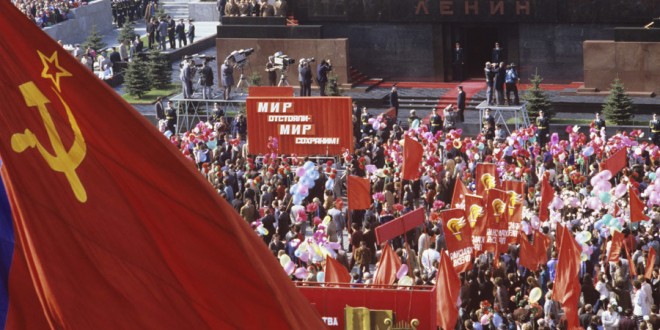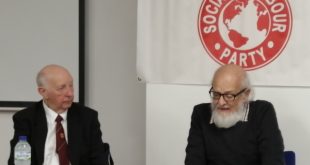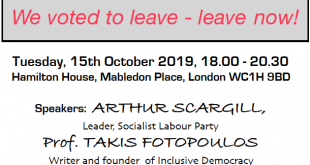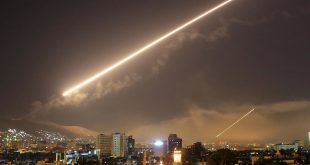We all know that the Soviet Union and the Eastern Block were not of course socialist “paradises”, although they did cover the basic needs of all their citizens, which was a major achievement given the level of development of Russia in 1917 —In comparison USA still does not cover today the basic needs of almost a third of its population! And still, they kept closer to the sense of community than today’s “Democracies” within neoliberal glonalization. The existence of a robust opposing pole to the Western and US imperialistic and aggressive aspirations was catalytic to a much more peaceful and hopeful world. Moreover, the exertion of influence of the massive communist movement (regardless if it succeeded or not) to the peoples around the world and the Left in the West, accounted for their united opposition to the US interventions worldwide, with significant success. By contrast, today, not only there is no mass movement against the criminal interventions of the Transnational Elite in Libya, Syria, Ukraine, or against the besieging of Russia etc., but a significant part of the globalist “Left”, indirectly, even embraces these unprecedented atrocities for the sake of the liberal “individual rights” of the Soroses of this world!
25 years since collapse of USSR, 25 years of global instability
(11.09.2016)
Marcus Papadopoulos
Yes, you have read the title of this article correctly. And no, this is not a press release by the Communist Party of the Russian Federation.
What this is, however, is an article documenting what has happened on the international stage since, and as a consequence of, the USSR’s demise, 25 years ago – an event which continues to affect the lives of ordinary people across the world, whether they are aware of it or not, and whether they like it or not.
This article stands diametrically opposed to the West’s standard narrative of the USSR, and it is this which makes this article particularly pertinent today, given that the West’s portrayal of itself as the “foundation of global peace and stability” has come to be exposed as nothing more than a façade and a manipulative lie. With that in mind, I ask of you, the reader, to be open-minded when reading this article and to set aside what Western politicians and mainstream journalists have constantly told you about the Soviet Union – a country which, amongst many other achievements, secured the victory over Nazism in the Second World War. As Winston Churchill wrote, it was the USSR that “tore the guts out of the Nazi war machine.”
Prior to 1991, the West, which is effectively the United States, had intervened, either by direct military force or through subversion, in the affairs of a number of independent, sovereign countries, such as Vietnam and Chile. And those interventions, which were illegal under international law, resulted in vast losses in human life and caused regional instability which, of course, had knock-on effects on global stability. However, from 1991 onwards, the rate at which the US has intervened in the domestic affairs of countries has increased exponentially, breaking international law like never before and acting in a brazen way like never before. The end result of those interventions has been to make the world more dangerous and more unstable than at any time since the Second World War.
The list of countries and regions which the US has intervened in is long and shocking, making for depressing reading: Bosnia, Croatia, Serbia, Kosovo, Afghanistan, Iraq, Libya, Syria and Ukraine. All of those countries are of immense geo-strategic importance, hence they were, and continue to be, on Washington’s radar. And in most of those cases, the Americans have either achieved, or attempted to achieve, their objectives by supporting Islamists (Bosnia, Libya and Syria), Fascists (Croatia and Ukraine) or organized crime (Kosovo).
That interference, which the West has carried out under the deceptive heading “humanitarian intervention,” has caused immense damage to the standing of international law and the mechanisms of the United Nations. It has turned hitherto stable countries and regions into deeply unstable places which have, literally speaking, gone up in flames. It has brought organized crime to towns and cities across Europe. And it has turned Islamist terrorism into a potent force which has spread like a malignant cancer to Europe.
So what accounts for the sudden and drastic increase in America’s interventions in the world since 1991? The answer is simple: the absence of the USSR.
The Soviet Union was a superpower which, from 1945 until its collapse in 1991, prevented the US from dominating the world (something that Washington achieved after the Soviet collapse, the consequences of which the world is suffering from today). With a vast industrial sector, a vast industrial-military complex and a vast military, which numbered over four million personnel in 1991, supported by a massive inventory of military equipment, the USSR acted as a formidable bloc to American ambitions.
When policymakers in Washington were plotting over which countries to intervene in to enhance American power, they always had to take into consideration what the response of the Soviet government would be. That is not to say, however, that the Americans were always deterred by the Soviet Union, as they were not. But US plans were severely curtailed because of Soviet power. What the world was witness to from 1945-1991 was a counter to American political, economic and military influence. That meant the US did not have a free hand in global affairs.
Now, while the world prior to 1991 was not safe, given that there were more nuclear weapons then than there are today, the number of countries being destabilized were far fewer prior to the Soviet collapse. Further to that, the rise of radical Islam and Islamist terrorism since 1991, which the Americans have played an instrumental role in as a result of their support for Islamists in Bosnia, Libya and Syria, poses a terrible danger today to the safety and security of ordinary people across the world on a daily basis.
Let us take a look at how the world would have developed had the USSR not collapsed.
First, the Cuban Missile Crisis was averted, in part, because the US had to negotiate with the Soviet Union. People in the West are not often told that one of the main reasons the USSR deployed ICBMs in Cuba was that the US already had its own ICBMs in Turkey, which, of course, shared a border with the Soviet Union. And people in the West are not often told that the Cuban crisis was resolved because the Soviet government agreed to withdraw its ICBMs from the Caribbean island in reciprocation for the Americans withdrawing their ICBMs from Turkey. Hence, out of a near catastrophe for the world emerged a more stable situation, in which neither the US, nor the USSR, had ICBMs on one another’s borders. It should be noted, however, that today there are US nuclear warheads in Turkey. Alas, the collapse of the USSR encouraged the Americans once again to deploy weapons of mass destruction in a country situated in a very volatile part of the world, and the Russian Federation did not act as deterrence in that case.
Second, the Soviet Union would not have tolerated Yugoslavia’s territorial integrity being torn to shreds as the West did from 1991-1992, and then again in 1999. The Soviet Government would have given its full support to the Yugoslav People’s Army to disarm and arrest the illegally armed groups which emerged in Slovenia, Croatia, Bosnia and Kosovo. And the Soviet Navy would have dispatched a flotilla to Yugoslav waters to deter Western military intervention. It should be remembered that, following the collapse of Communism in Eastern Europe in 1989, Yugoslavia began to turn to the USSR for support.
Third, the Soviet Union deployed its military forces in Afghanistan to neutralize increasing radical Islam there. Partly as a result of the Soviet collapse, the Taliban, under the direction of close US ally Pakistan, soon came to power in Afghanistan. Had the USSR not collapsed, it is possible that the Taliban would not have taken control of the country, and it is certain that the Americans would not have invaded Afghanistan, as they did in 2001. Under no circumstances would the Soviet government have tolerated an American presence in Afghanistan on the borders of Soviet Central Asia – and Washington would have known this. Hence, the terribly dangerous situation in Afghanistan today caused by the American invasion would have been averted through the Soviet deterrent.
Fourth, Iraq, while also an ally of the West, was also an important ally to the USSR. And like the West, the Soviet Government sold vast amounts of military equipment to the Iraqis. During the Iran-Iraq War, Soviet battleships and freighters were sent to the Persian Gulf to ensure non-interrupted supplies of Iraqi oil. The Americans would never have invaded Iraq, like they did in 2003, with the Soviet Union in existence. Washington would have known that an invasion of Iraq could have brought the US and the USSR to the point of war.
Fifth, Libya was an important arms market for the USSR and gave Moscow considerable leverage in North Africa. It follows, therefore, that the Soviet Government would have dispatched a naval flotilla to the Libyan coast if the Americans, British and French had considered military intervention to overthrow Muammar Gaddafi, like they did in 2011. Plans for Western intervention in Libya would have been deterred.
Sixth, Syria was the Soviet Union’s closest friend and ally in the Middle East and acted as the Soviet government’s eyes and ears in this hugely important part of the world. The Americans would never have considered supporting terrorist groups in Syria, as they are doing today. Washington knew just how close relations between Syria and the USSR were. The US would not have touched Syria, just as the USSR would not have touched Israel, a staunch friend and ally of America.
Seventh, Ukraine would not be edging towards membership in the European Union and NATO due to US influence today, because had the USSR not collapsed, the artificially created country of Ukraine would not exist.
It is all too easy to forget that, prior to 1991, American interventions in the world were not as common as they have become today. The Americans, at that point in time, understood that there were limitations on their ambitions and power – and this took the form of the Soviet Union. The US could not simply bomb a country (Serbia) and then take a piece of its territory and proclaim it as “independent” (Kosovo), or invade a country in one of the most geo-strategically important regions of the world (Iraq), depose both its leader and government and replace it with a pro-American one.
If one looks at the countries and regions in the world which are jeopardizing global peace and stability today, one will see that they have all become destabilized by American interventions – from the former Yugoslavia to Iraq to Libya to Syria to Ukraine. And the US succeeded in intervening in those countries because there was no deterrent – no Soviet Union.
Now, Russia, under the leadership of Vladimir Putin, has regained a lot of its lost superpower status. And that is very good for peace and very good for stability in the world. So, for instance, if Russia today was weak, like it was in the 1990s, the Americans would more than likely have opted for direct military force in Syria to topple President Bashar al-Assad. Hence, it is evident that the US does not have the free hand in global affairs which it enjoyed after the Soviet collapse – and this is due to a Russian deterrent.
However, the current Russia does not have the power that the USSR possessed. Perhaps, and hopefully, it will one day. But until then, American interventions will remain a feature of the world in which we live today, albeit reduced in their frequency.
The Soviet Union, which the vast majority of its citizens expressed support for in a March 1991 referendum, proved to be not just a success for its people, but also for global peace and stability as well. This year marks 25 years since that positive force on the international stage disappeared. Suffice it to say that the world today is a more dangerous place because of the absence of the USSR.
Dr. Marcus Papadopoulos is an editor of Politics First magazine and an expert on Russia and the rest of the former Soviet Union.
 ANTIGLOBALIZATION – SELF-RELIANCE – INCLUSIVE DEMOCRACY Building Popular Fronts for National and Social Liberation (FNSL): for a Democratic Community of Sovereign Nations towards an Inclusive Democracy
ANTIGLOBALIZATION – SELF-RELIANCE – INCLUSIVE DEMOCRACY Building Popular Fronts for National and Social Liberation (FNSL): for a Democratic Community of Sovereign Nations towards an Inclusive Democracy







